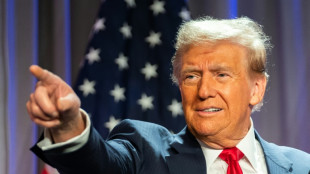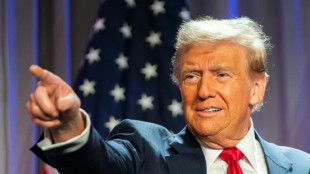

G7 leaders agree $50 billion loan for Ukraine
G7 leaders agreed Thursday on a new $50 billion loan for Ukraine using profits from frozen Russian assets, support that was welcomed by President Volodymr Zelensky -- though he emphasised the need for more weapons.
"We have reached political agreement to provide additional financial support to Ukraine of approximately $50 billion by the end of the year," Italian Prime Minister Giorgia Meloni announced after the first day of a summit in Puglia.
Meloni had invited Zelensky to join a special summit session on the Ukraine war with US President Joe Biden and the leaders of France, Germany, Canada, Japan and Britain.
Addressing the meeting at the luxury Borgo Egnazia resort, Zelensky thanked the leaders for their support, which he said would go towards "both defence and reconstruction".
But he urged Kyiv's allies to go further and actually confiscate Russia' frozen assets, an option the European Union has so far ruled out for fear it would rattle international markets.
And he said Ukrainian forces still needed more air-defence systems to help counter attacks by Moscow, which has been pummelling Kyiv's front-line troops and the country's power grid.
- Loan syndicate -
The EU agreed earlier this year to help Kyiv using the profits from the interest on Russian central bank assets frozen by Western allies.
But Washington has been pushing for more and faster help through a huge upfront loan, though it was not clear who would issue the money, and who would cover the risk.
A senior Biden administration official said Thursday that the US was willing to provide up to $50 billion, but said its contribution could be "significantly less" as it would be a shared initiative.
"We will not be the only lenders. This will be a loan syndicate. We're going to share the risk, because we have a shared commitment to get this done," the official said on condition of anonymity.
He would not say how much other G7 countries would contribute.
- 'Historic step' -
G7 countries, which count the European Union as their unofficial eighth member, have been Ukraine's key military and financial backers since Russia invaded in February 2022.
The G7 and the EU have frozen around 300 billion euros ($325 billion) of Russian assets, much of it frozen by Euroclear, an international deposit organisation based in Belgium.
EU countries say they could generate 2.5 to 3.0 billion euros a year for Kyiv from the profits on the interest.
German Chancellor Olaf Scholz hailed the loan agreement as a "historic step" and a "clear signal to the Russian president that he cannot simply sit this matter out".
"The basis has been created for Ukraine to be in a position to procure everything it needs... in the near future, in terms of weapons but also in terms of investment in reconstruction or in energy infrastructure," he said.
Zelensky, who was due to hold a joint press conference with Biden later Thursday, has been engaged in a flurry of diplomacy aimed at shoring up international support.
He spoke earlier this week in Berlin at a reconstruction conference and is set to join more than 90 countries and organisations this weekend for a peace summit in Switzerland.
In Puglia on Thursday, he signed two more security agreements, with Japan and the United States.
- Political flux -
The summit comes at a time of extraordinary global turmoil.
Apart from the conflict in Ukraine, the Hamas-Israel conflict in Gaza is raging and economic tensions are rising between China and Western countries.
Many G7 countries are also in political flux, with summit attendees aware this could be Biden's last G7 summit if he loses to Donald Trump in November elections.
Britain's Prime Minister Rishi Sunak is tipped to be ousted in July 4 elections, while France's Emmanuel Macron and Germany's Scholz are both under pressure after gains by the far right in EU Parliament elections last weekend.
The summit talks began with a short session on Africa, development and climate change, before turning to the Middle East.
G7 leaders have already announced their support for a Gaza truce deal outlined by Biden, which would also see the release of hostages taken in Hamas' October 7 attack on Israel.
W.F.Walter--MP




